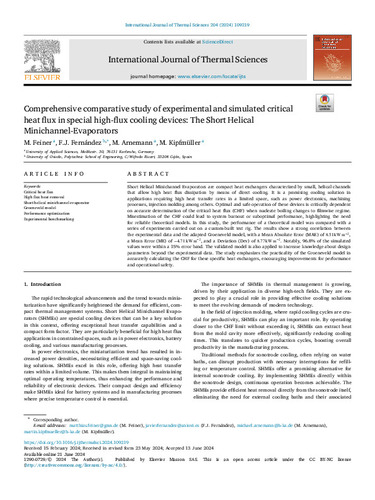Comprehensive comparative study of experimental and simulated critical heat flux in special high-flux cooling devices: the short helical minichannel-evaporators
Autor(es) y otros:
Fecha de publicación:
Versión del editor:
Citación:
Resumen:
Short Helical Minichannel Evaporators are compact heat exchangers characterized by small, helical channels that allow high heat flux dissipation by means of direct cooling. It is a promising cooling solution in applications requiring high heat transfer rates in a limited space, such as power electronics, machining processes, injection molding among others. Optimal and safe operation of these devices is critically dependent on accurate determination of the critical heat flux (CHF) when nucleate boiling changes to filmwise regime. Misestimation of the CHF could lead to system burnout or suboptimal performance, highlighting the need for reliable theoretical models. In this study, the performance of a theoretical model was compared with a series of experiments carried out on a custom-built test rig. The results show a strong correlation between the experimental data and the adapted Groeneveld model, with a Mean Absolute Error (MAE) of 8.51 kWm−2, a Mean Error (ME) of −4.71 kWm−2, and a Deviation (Dev) of 8.77 kWm−2. Notably, 96.8% of the simulated values were within a 15% error band. The validated model is also applied to increase knowledge about design parameters beyond the experimental data. The study emphasizes the practicality of the Groeneveld model in accurately calculating the CHF for these specific heat exchangers, encouraging improvements for performance and operational safety.
Short Helical Minichannel Evaporators are compact heat exchangers characterized by small, helical channels that allow high heat flux dissipation by means of direct cooling. It is a promising cooling solution in applications requiring high heat transfer rates in a limited space, such as power electronics, machining processes, injection molding among others. Optimal and safe operation of these devices is critically dependent on accurate determination of the critical heat flux (CHF) when nucleate boiling changes to filmwise regime. Misestimation of the CHF could lead to system burnout or suboptimal performance, highlighting the need for reliable theoretical models. In this study, the performance of a theoretical model was compared with a series of experiments carried out on a custom-built test rig. The results show a strong correlation between the experimental data and the adapted Groeneveld model, with a Mean Absolute Error (MAE) of 8.51 kWm−2, a Mean Error (ME) of −4.71 kWm−2, and a Deviation (Dev) of 8.77 kWm−2. Notably, 96.8% of the simulated values were within a 15% error band. The validated model is also applied to increase knowledge about design parameters beyond the experimental data. The study emphasizes the practicality of the Groeneveld model in accurately calculating the CHF for these specific heat exchangers, encouraging improvements for performance and operational safety.
Patrocinado por:
German Federal Ministry for Economic Affairs and Climate Action [ZF4102824TV8]
Ficheros en el ítem





